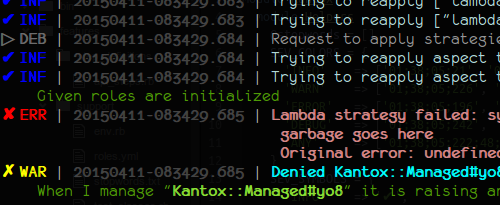Log With Pleasure
One half of my working time I spend staring like a stuck pig at my logs. (In case anybody’s wondering: another half I gaze on pry’s debugger stack; in pauses I keep my eyes fixed on code itself.) Logs are great. You may run an application, go drink a couple ristrettos, get back to your table and reflectively read what that huge clumsy sluggish piece of code, having words ‘innovative’ and ‘revolutionary’ in it‘s name had spitted out to console.
The main problem is that log is like dormitory. Unfortunately, my colleagues get used to utilize the same working routine; rails and other plugged in engines seem to feel themselves lonely without communication as well. The log looks like a trash can. Grokking logs is a hard task, requiring from the brave log explorer such skills like “Mouse Wheel Scrolling Master,” “Eye Scanner Level 80” and “Winner of World Gotcha Championship.”
I want to share a couple of tricks helping me to utilize the log in cosy manner.
Intercepting standard Rails log
First of all, to tune the log we have to gain an access to it. Let’s do it.
@logdevice = const_defined? 'Rails' ?
::Rails.logger
.instance_variable_get(:@logger)
.instance_variable_get(:@log) :
Logger.new($stdout)
@tty = @logdevice.instance_variable_get(:@logdev)
.instance_variable_get(:@dev).tty? ||
const_defined?('Rails') && ::Rails.env.development?
The latter condition in @tty check is required to force @tty be set to true
in Rails development environment, where logs are going through development.log
file, yet most purpose is to review them on the fly in the console.
Now we should not forget about our colleagues, who probably would not admit the accidental log format change as long-awaited Christmas gift.
@keep_out = Kernel.const_defined?('Rails') && ::Rails.env.production? ||
ENV['RAILS_PRETTY_LOG'] != '42'
OK, my log modifications would never affect neither production env, nor alien
environments not having RAILS_PRETTY_LOG environment variable set to 42.
Fine. Let’s hack a log a bit. First of all, let’s add colors.
SEV_COLORS = {
'INFO' => ['01;38;05;21', '00;38;05;152'],
'WARN' => ['01;38;05;226', '00;38;05;222'],
'ERROR' => ['01;38;05;196', '01;38;05;174'],
'DEBUG' => ['01;38;05;242', '00;38;05;246'],
'ANY' => ['01;38;05;222;48;05;238', '01;38;05;253;48;05;238']
}
def self.clrz txt, clr
return txt unless @tty
"\e[#{clr}m#{txt.gsub(/«(.*?)»/, "\e[01;38;05;51m\\1\e[#{clr}m")}\e[0m"
end
We will colorize different types of messages (red errors, blue infos, darkgrayed debugs, all that stuff.) Whether the message contains text in guillemets, it will be automatically highlighted.
Fine. Now let’s introduce the stopwords.
@stopwords = []
def logger_stopwords file
@stopwords += File.read(file).split($/).map { |l| Regexp.new l } rescue nil
end
Once the text file, having list of regexps one by line, is loaded with
aforementioned logger_stopwords function, matching messages would be removed
from log. This is quite useful for filtering ActiveRecords’s debug littered
with infinite SQL statements.
It sounds like everything is ready. Let’s implement our own formatter.
SEV_SYMBOLS = {
'INFO' => '✔',
'WARN' => '✗',
'ERROR' => '✘',
'DEBUG' => '✓',
'ANY' => '▷'
}
unless @keep_out
@logdevice.formatter = proc { |severity, datetime, progname, message|
message.strip! # strip
message.gsub! "\n", "\n#{' ' * 31}" # align new lines pretty
if message.empty? || @stopwords.any? { |sw| sw =~ message }
nil # skip stopwords
else
'' << clrz(clrz("#{SEV_SYMBOLS[severity]} ", SEV_COLORS[severity].first) \
<< clrz(severity[0..2], SEV_COLORS[severity].first) \
<< ' | ' \
<< clrz(datetime.strftime('%Y%m%d-%H%M%S.%3N'), '01;38;05;238') \
<< ' | ' \
<< clrz(message, SEV_COLORS[severity].last) \
<< "\n"
end
}
end
The above will filter everything matching stopwords, format multiline strings in more human-readable manner and colorize output when printing on console. Nifty symbols will be prepended to every message, making it even easier to navigate eyes through bundles of lines on the screen.
The only thing left to mention is ANY severity: it will be spitted out despite
current log level. This is useful, e.g., to print out some values quite
temporarily, not switching the context.
Well, we are to define wrappers:
%i(warn info error debug).each do |m|
class_eval "
def #{m} message
logger.#{m}(message)
end
module_function :#{m}
"
end
Let’s run it and go take another ristretto.
